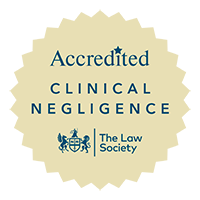Top ranked cerebral palsy claims lawyers
UPDATE - You can now read about HSIB's full report here.
HSIB have launched an investigation into the way that ethnicity affects the detection of neonatal jaundice. The healthcare watchdog will explore the safety issues associated with delayed recognition of jaundice in newborn babies, including the reliance on visual signs to make the diagnosis.
HSIB say their investigation follows the case of a newborn baby of black African ethnicity, whose diagnosis of jaundice was delayed, despite blood tests showing jaundice during the first two days of the baby’s life. HSIB’s investigation will consider the impact that a baby’s ethnicity (and skin colour) has on timely diagnosis.
Delays in diagnosis and treatment of neonatal jaundice can lead to permanent brain injury from kernicterus, a severe condition which causes cerebral palsy and lifelong disability. Kernicterus is preventable with correct midwifery and neonatal care. No baby who receives timely diagnosis and correct treatment for jaundice should ever suffer from kernicterus brain injury.
What is jaundice and kernicterus?
Neonatal jaundice describes the early signs that a newborn baby has too much bilirubin in their blood. This is also known as hyperbilirubinaemia. The body has a normal process for breaking down old red blood cells. During this process, a yellow pigment called bilirubin is released into the bloodstream. The bilirubin is processed by the liver and stored to help digest fats in the small intestine (as bile), and then leaves the body with the rest of the body’s waste. If a newborn baby’s liver is unable to process all the bilirubin in their bloodstream, the remaining unprocessed bilirubin can damage the brain and spinal cord, causing permanent neurological disability. This neurological damage is known as bilirubin encephalopathy. The yellow staining and pattern of damage to the brain is known as kernicterus.
Jaundice affects 60% of babies who are born at full term, and 80% of premature babies, in their first week of life. Babies who are fed on breast milk alone are at higher risk. Jaundice can be harmless and often resolves within two weeks, but it must be diagnosed early, monitored carefully and treated with phototherapy and/or exchange transfusion to ensure that the baby does not develop kernicterus.
Neonatal jaundice can also indicate that the baby needs treatment for other serious conditions, such as sepsis, liver disease, sickle cell anaemia and other potentially dangerous disorders.
Why are HSIB investigating the impact of ethnicity on diagnosis of jaundice?
Midwives are trained to look out for visual signs of jaundice in newborn babies. These signs include yellow discolouration of the baby’s skin or the whites of their eyes, and unusual colouring or staining of the stools and urine in the baby’s nappy.
In our experience of specialist neonatal brain injury claims for darker-skinned children with kernicterus brain injury, hospital or community midwives often dismissed parents’ concerns about the discolouration of their child’s skin and failed to allow for the child’s naturally darker skin colour when carrying out the necessary checks to make a timely diagnosis of jaundice.
HSIB also recently reported that ‘white skin bias’ has been found to delay diagnosis of serious illness in children and called for training resources to include examples of signs of illness in children with non-white skin.
Claims for children with serious injury from negligent treatment of jaundice
In 2018, NHS Resolution reviewed 20 medical negligence claims against the NHS (from 2001 and 2011) relating to serious injury suffered by babies as a result of negligent treatment of neonatal jaundice. These cases highlighted examples of incorrect care, such as midwives incorrectly reassuring parents or advising them that their baby’s jaundice could be treated by placing them in the sun, delays in starting treatment, admitting babies to the neonatal intensive care unit (NICU), or back to hospital after they had come home, and failing to diagnose other related conditions. NHS Resolution estimated that the financial cost of compensating the affected families was £150.5m.
Kernicterus brain damage is preventable, but our medical negligence team are still seeing children who have suffered severe and permanent harm from negligent management of neonatal jaundice.
It is essential that all who manage the care of newborn babies understand that is negligent to fail to diagnose jaundice or properly monitor a newborn baby’s bilirubin levels, to delay admitting or readmitting a baby to hospital or NICU, or to delay their phototherapy or exchange transfusion treatment. It is also negligent to reassure parents falsely or dismiss their concerns about discolouration of their baby’s skin and to fail to use other methods to detect jaundice in a baby of non-white ethnicity. Even where correct reassurance is given, parents must be advised when and how to seek urgent medical help if the baby’s condition doesn’t resolve or deteriorates.
What happens next?
HSIB says their investigation will:
- understand the context and factors that influence delays in diagnosis of jaundice in newborn babies;
- explore the reliance on visual signs as a way to detect neonatal jaundice, and how ethnicity affects this;
- look into how national guidance and information supports the diagnosis of jaundice in newborn babies with black and brown skin;
- identify how their findings can be used to reduce the risk of delayed diagnosis of jaundice in newborn babies;
- make safety recommendations to improve patient safety.
Boyes Turner’s neonatal brain injury claims specialists keenly await the outcome of HSIB’s investigation.
If you are caring for a child with cerebral palsy or neurological disability caused by medical negligence, you can talk to one of our solicitors, free and confidentially, to find out more about making a claim, by contacting us here.
They have a great deal of knowledge and expertise, and client care seems to be their top priority.
Chambers Guide to the Legal Profession
Contact our expert Cerebral Palsy solicitors today for support with your claim




